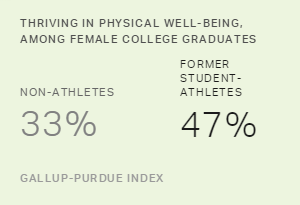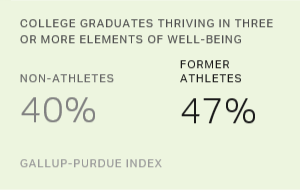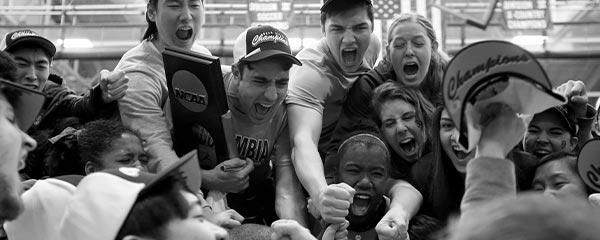Female former student-athletes outperform other college graduates on important career and life outcomes. They are significantly more likely to be engaged in their work and thriving in several areas of well-being compared with college graduates -- including their male former student-athlete counterparts. These findings are according to a new analysis based on the Gallup-Purdue Index, a large national study of college graduates that measures whether graduates achieve "great jobs" and "great lives" by evaluating their workplace engagement and overall life well-being, among other outcomes. For female former student-athletes, it's a convincing win on these "off the field" outcomes, and builds on a growing set of findings about the positive links between women (and girls) and sports.
Previous research has demonstrated that high school girls who play sports are more likely to get better grades and graduate than girls who do not play sports. Girls and women who play sports also have higher confidence and self-esteem levels. Many of these studies have compared females who participate in sports with females who do not.
The Gallup-Purdue Index findings build on this previous research base in new and significant ways by demonstrating links to longer-term outcomes in work and life, and by revealing better outcomes for women compared with male former student-athletes and non-student-athletes as well.
Female college graduates who played NCAA Division I, II or III sports in college are more likely to be employed full time for an employer (62%), compared with female graduates who were not student-athletes (56%). They are also more likely to be participating in the workforce than their non-athlete peers -- 9% of female former student-athletes are not part of the workforce, compared with 17% of female non-student-athletes. Female former student-athletes are more likely to be employed and are somewhat more likely to be engaged in their work (48%), compared with female non-athlete grads (41%). And not only do they outperform their female non-athlete counterparts on this measure, they also top both male former athletes (38%) and male non-athletes (36%) by a wide margin. When it comes to the likelihood of having a great job, female former student-athletes win across the board on these comparisons.

Female former student-athletes are also more likely to be thriving in a number of areas of their well-being -- particularly in their social and physical well-being. Fifty-three percent of female former student-athletes are thriving in their social well-being (defined as having strong, supportive relationships and love in one's life), compared with 48% of their female non-athlete counterparts, 52% of male former student-athletes and 44% of male non-athletes. When it comes to physical well-being (having good health and enough energy to get things done on a daily basis), female former student-athletes distinguish themselves the most: 47% are thriving in physical well-being, compared with 33% of female non-athletes, 36% of male former athletes and 32% of male non-athletes. Female college graduates who played sports in college are winning in well-being later in life too.
In a day and age in which gender inequality continues to exist on so many levels, it is greatly encouraging to see indicators of real success on which female athletes achieve better outcomes than their college graduate counterparts -- male, female, athlete or otherwise. And that's real cause for celebration.

